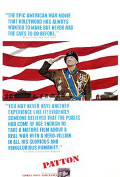
Directed by
Franklin J. Schaffner
170 minutes
Rated M
Reviewed by
Bernard Hemingway

Patton
Franklin J. Schaffner’s film is probably the last war film of its kind, a big budget epic that, if not exactly pro-militaristic then one that keeps the realities of war at arm’s length and focuses more on its grand ideas. This, of course, is a reflection of the character of its principal subject matter, General George S. Patton, a blood-and-guts commander with a metaphysical (and some might say psychopathic) view of the heroism of war and his manifest destiny as its prime exemplar. That the film won a raft of Oscars, including Best Picture, Best Director, Best Actor, Best Screenplay, Best Editing, and Best Production Design is more a reflection of a US smarting from its defeat in Vietnam than the inherent merits of the film.Written by Edmund H. North and Francis Ford Coppola (who, of course, would return to related material eight years later with Apocalypse Now, his Colonel Kilgore being a close relative to Patton) the film works best as a portrait of Patton than as a war film, per se, as it has been superseded technically by the much more convincing realism and stylistically by the emergence of the grunt's point-of-view of films since whether Apocalypse Now or Saving Private Ryan (1998) although some of the battle scenes are impressively staged, at least in terms of scale.
Patton is portrayed as a tragic hero, a solider of the old school, who was unable to reconcile his Neitzschean ideals to the modern world and what he considered to be the pettiness of bureaucracy and diplomacy. Despite his apparent skill as a military strategist the defining moment of his career was not a victorious battle but an incident in which he slapped an enlisted man and called him a coward and which effectively brought about his fall from grace.
George C. Scott gives a fitting rendition of the myth although as this largely amounts to oscillating between bombast and self-irony it hardly constitutes one of the great screen performances and it is to his credit that he refused to accept his Oscar. For my money Karl Malden has the role of his career as General Omar Bradley the diligent counter-point to Patton’s tough-guy swagger. Although it has its moments, such as the memorable opening scene of Patton orating in front of a huge American flag, the film is overlong. Nevertheless, as a portrait of a singular man it is worth forbearing the extensive stunt work that passes for war.
Want something different?





